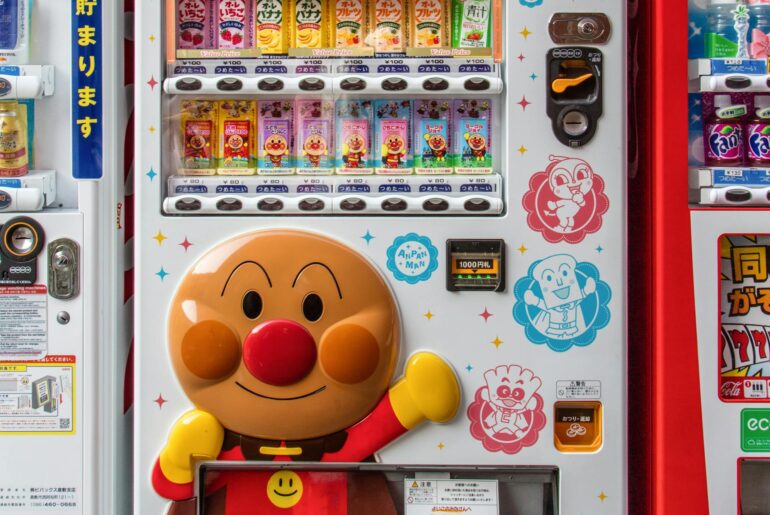This article may contain references to products or services from one or more of our advertisers or partners. We may receive compensation when you click on links to those products or services. Nonetheless, our opinions are our own.
The information presented in this article is accurate to the best of our knowledge at the time of publication. However, information is subject to change, and no guarantees are made about the continued accuracy or completeness of this content after its publication date.
If you put vending machines in busy places where people always want to buy things, they can be a good way to make money. The secret to success is picking places where people often need quick and easy access to snacks, drinks, or other important items. Here are some of the best places to put vending machines, along with some important things to think about for each one.
- 1. Schools and Universities
- 2. Office Buildings and Business Centers
- 3. Hospitals and Medical Centers
- 4. Shopping Malls and Retail Stores
- 5. Public Transportation Hubs (Bus/Train Stations, Airports)
- 6. Gyms and Fitness Centers
- 7. Hotels and Motels
- 8. Factories and Warehouses
- 9. Parks and Recreational Areas
- 10. Apartment Complexes and Residential Areas
- Comparing Vending Machine Locations
- Final Thoughts
- Frequently Asked Questions
- What are the most profitable locations for vending machines?
- Do I need permission to place a vending machine in a public space?
- What are the best products to stock in a vending machine?
- How much does it cost to start a vending machine business?
- How often should vending machines be restocked?
- What are common maintenance issues with vending machines?
- Can vending machines accept credit cards and mobile payments?
- Recommended Reads
1. Schools and Universities
Why? Schools and universities have a steady flow of students, faculty, and staff who often need quick snacks and drinks between classes. Many schools have limited cafeteria hours, making vending machines a convenient alternative.
Considerations: Some schools have regulations on the types of products that can be sold, particularly regarding healthy snack options. Additionally, securing a contract with the school administration may be necessary.
2. Office Buildings and Business Centers
Why? Employees working in offices or corporate environments often look for quick and accessible refreshments, especially if the building has limited cafeteria or dining options.
Considerations: Securing permission from building management is essential. Offering a mix of snacks, beverages, and healthier options can appeal to a broader audience.
3. Hospitals and Medical Centers
Why? Hospitals operate 24/7, and vending machines provide a convenient option for medical staff, patients, and visitors who may not have time to visit a cafeteria.
Considerations: Stocking healthy options such as low-sugar snacks and hydration-focused beverages can cater to dietary restrictions and health-conscious consumers.
4. Shopping Malls and Retail Stores
Why? Shoppers often spend hours browsing stores and may need a quick refreshment to stay energized.
Considerations: Machines should be placed in high-traffic areas such as entrances, food courts, or seating areas to maximize visibility.
5. Public Transportation Hubs (Bus/Train Stations, Airports)
Why? Travelers frequently seek quick and easy snacks while waiting for their ride or during layovers.
Considerations: The best placements are near waiting areas, ticket counters, or departure gates. High visibility and easy access are crucial in these fast-paced environments.
Voted "Best Overall Budgeting App" by Forbes and WSJ
Monarch Money helps you budget, track spending, set goals, and plan your financial future—all in one app.
Get 50% OFF your first year with code MONARCHVIP
6. Gyms and Fitness Centers
Why? Gym-goers often purchase protein bars, energy drinks, and water before or after their workout sessions.
Considerations: Stocking health-focused products such as protein-based snacks and electrolyte-rich drinks can increase sales.
7. Hotels and Motels
Why? Guests may arrive at odd hours when restaurants are closed, making vending machines a convenient alternative.
Considerations: Machines should be placed in lobbies, hallways, or near elevators for easy access.
8. Factories and Warehouses
Why? Employees working long shifts need quick snacks and drinks, especially in workplaces without nearby food options.
Considerations: Machines should offer a mix of energy-boosting snacks and hydrating beverages.
9. Parks and Recreational Areas
Why? People engaging in outdoor activities, such as jogging or picnicking, often look for refreshment options.
Considerations: Machines should be placed near restrooms, benches, or picnic areas for maximum convenience.
10. Apartment Complexes and Residential Areas
Why? Residents appreciate easy access to snacks and beverages, especially for late-night cravings or quick grab-and-go options.
Considerations: Ideal placements include shared spaces such as lobbies, laundry rooms, or near mailrooms.
Comparing Vending Machine Locations
| Location Type | Traffic Level | Best Product Types |
|---|---|---|
| Schools & Universities | High | Snacks, drinks, healthy options |
| Office Buildings | Medium-High | Snacks, coffee, water |
| Hospitals | High | Healthy snacks, drinks |
| Shopping Malls | High | Soda, chips, candy |
| Gyms & Fitness Centers | Medium | Protein bars, energy drinks |
Final Thoughts
Choosing the best place for a vending machine is important for making the most money. Areas with a lot of foot traffic and a steady stream of customers tend to do the best. However, when deciding where to put a vending machine, operators should also think about permits, product selection, and how to keep the machine running. Vending businesses can do well in a competitive market by knowing what their potential customers want and placing their machines in the right places.
Frequently Asked Questions
What are the most profitable locations for vending machines?
High-traffic areas such as schools, office buildings, hospitals, and shopping malls tend to be the most profitable. Locations where people need quick access to snacks or beverages, such as transportation hubs and fitness centers, also perform well.
Do I need permission to place a vending machine in a public space?
Yes, you will need permission from property owners or management. In some cases, you may also need a permit from local authorities.
What are the best products to stock in a vending machine?
This depends on the location. Schools and gyms benefit from healthy snacks, while office buildings and shopping malls perform well with a mix of beverages, snacks, and energy-boosting options.
How much does it cost to start a vending machine business?
Startup costs vary but typically range from $2,000 to $10,000 per machine, including the cost of the machine, initial inventory, and placement fees.
How often should vending machines be restocked?
Restocking frequency depends on sales volume. High-traffic locations may require restocking every few days, while lower-traffic locations might only need servicing once a week.
What are common maintenance issues with vending machines?
Common issues include coin and bill acceptor jams, product misdispensing, and refrigeration failures. Regular servicing and inspections can help minimize downtime.
Can vending machines accept credit cards and mobile payments?
Yes, many modern vending machines are equipped with cashless payment options, including credit cards, debit cards, and mobile payment apps like Apple Pay and Google Pay.

Reviewed and edited by Albert Fang.
See a typo or want to suggest an edit/revision to the content? Use the contact us form to provide feedback.
At FangWallet, we value editorial integrity and open collaboration in curating quality content for readers to enjoy. Much appreciated for the assist.
Did you like our article and find it insightful? We encourage sharing the article link with family and friends to benefit as well - better yet, sharing on social media. Thank you for the support! 🍉
Article Title: Best Locations for Vending Machines: Maximizing Profit and Convenience
https://fangwallet.com/2025/06/19/locations-for-vending-machines/The FangWallet Promise
FangWallet is an editorially independent resource - founded on breaking down challenging financial concepts for anyone to understand since 2014. While we adhere to editorial integrity, note that this post may contain references to products from our partners.
The FangWallet promise is always to have your best interest in mind and be transparent and honest about the financial picture.
Become an Insider

Subscribe to get a free daily budget planner printable to help get your money on track!
Make passive money the right way. No spam.
Editorial Disclaimer: The editorial content on this page is not provided by any of the companies mentioned. The opinions expressed here are the author's alone.
The content of this website is for informational purposes only and does not represent investment advice, or an offer or solicitation to buy or sell any security, investment, or product. Investors are encouraged to do their own due diligence, and, if necessary, consult professional advising before making any investment decisions. Investing involves a high degree of risk, and financial losses may occur including the potential loss of principal.
Source Citation References:
+ Inspo
There are no additional citations or references to note for this article at this time.












































